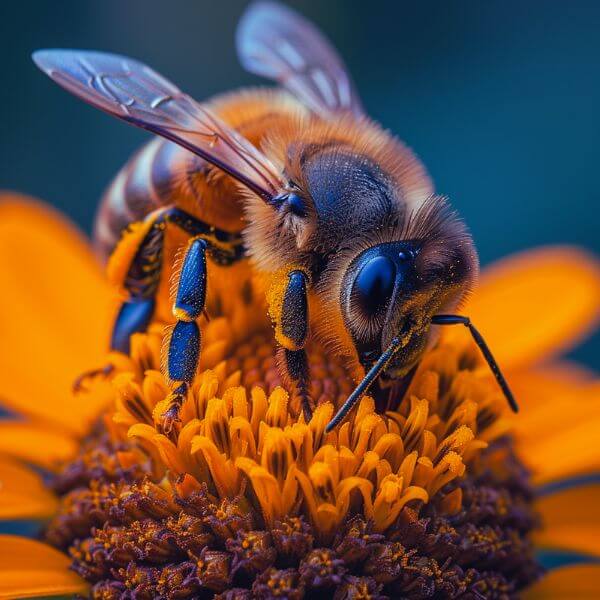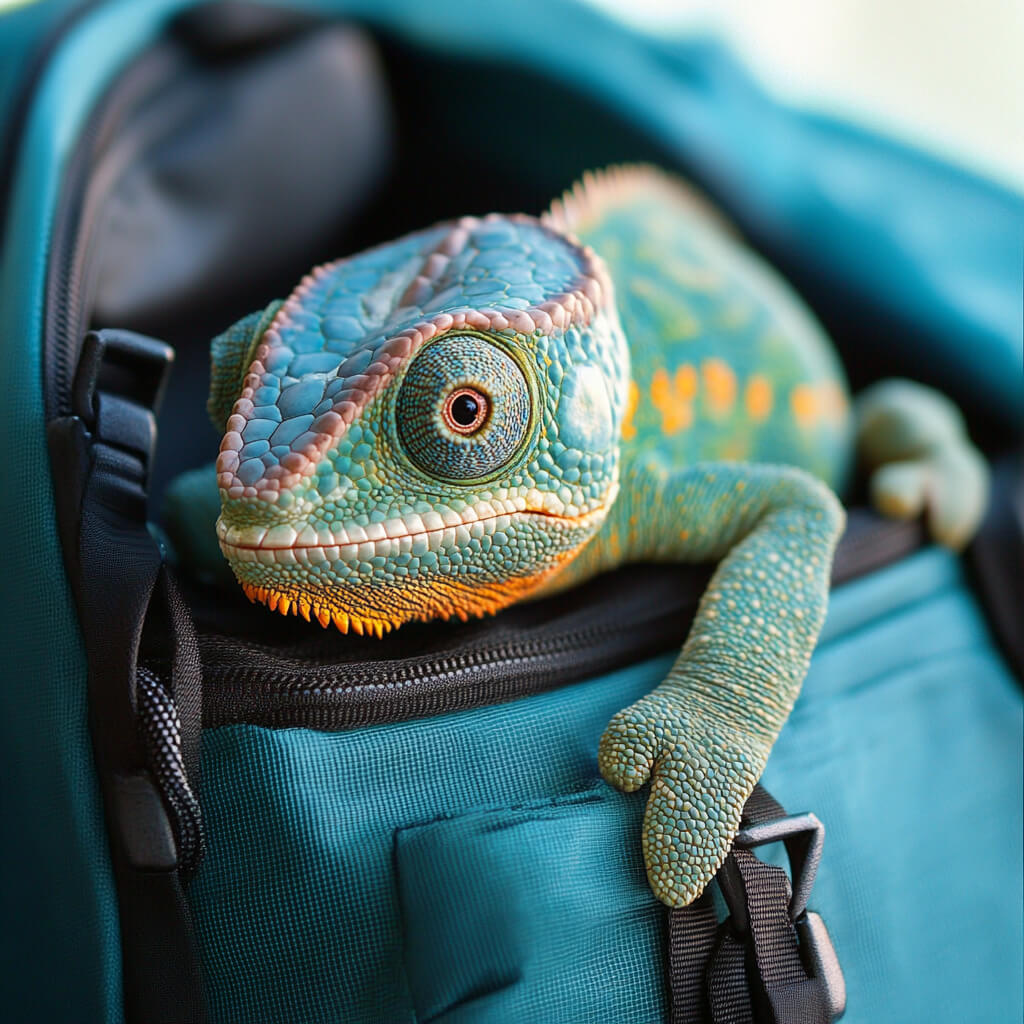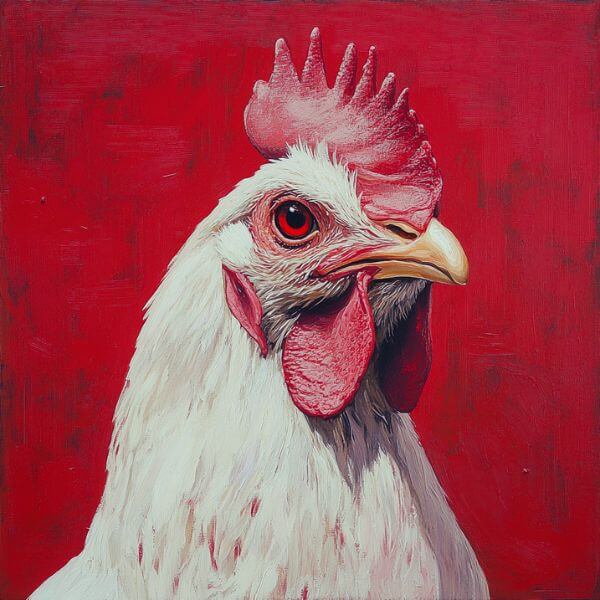The short answer is… it’s complicated.
While chameleons can physically eat bees, it doesn’t mean they should.
Factors to consider:
- Bee stings can be dangerous
- Bees might be too large for some chameleon species
- The nutritional value may not outweigh the risks
Chameleon Diet: What Do They Typically Eat?
In the wild, chameleons are insectivores, meaning they munch on a variety of creepy crawlies.
Their diet usually includes:
| Common Chameleon Foods | Nutritional Value |
| Crickets | High in protein |
| Roaches | Good fat content |
| Mealworms | Rich in fiber |
| Flies | Lean protein |
| Grasshoppers | Excellent calcium |
Chameleons need a balance of protein, vitamins, and minerals to thrive.
In captivity, it’s crucial to mimic their natural diet as closely as possible.
Risks of Chameleons Eating Bees
Letting your chameleon snack on bees isn’t exactly a walk in the park. Here’s why:
- Stinger danger: Bees can sting your chameleon’s tongue or inside of their mouth.
- Allergic reactions: Just like humans, chameleons can be allergic to bee venom.
- Size issues: Bees might be too big for smaller chameleon species to handle.
🚨 Warning: Never intentionally feed bees to your pet chameleon due to these risks!
Bee Venom and Its Effects on Chameleons
Bee venom is a cocktail of compounds that can spell trouble for your scaly friend:
| Venom Component | Potential Effect on Chameleons |
| Melittin | Pain and inflammation |
| Phospholipase A | Possible allergic reaction |
| Hyaluronidase | Increased venom spread |
While chameleons have tough skin, their mouths and digestive tracts are more vulnerable.
A bee sting could lead to swelling, pain, and in severe cases, anaphylactic shock.
Chameleon Hunting Behavior and Bees
Chameleons are ambush predators with a unique hunting style. They use their long, sticky tongues to catch prey from a distance.
This method works great for flies and crickets, but bees? Not so much.
In the wild, chameleons might occasionally encounter bees, but they’re not a staple in their diet.
The risk of getting stung usually outweighs the potential meal.
Safe Alternatives to Bees in Chameleon Diet
Instead of risking bee-related drama, try these safer options:
| Safe Insect | Nutritional Benefit | Feeding Frequency |
| Crickets | All-round good nutrition | 2-3 times a week |
| Dubia roaches | High protein, low fat | 1-2 times a week |
| Silkworms | Excellent calcium-phosphorus ratio | Once a week |
| Hornworms | High moisture content | As treats |
| Butterworms | High in fat, good for weight gain | Occasionally |
These insects provide similar or better nutrition than bees without the sting risk.
Plus, they’re easier to source and safer to handle.
Feeding Pet Chameleons: Best Practices
Keep your chameleon happy and healthy with these feeding tips:
- Variety is key: Mix up their diet to ensure balanced nutrition.
- Size matters: Offer insects no larger than the space between your chameleon’s eyes.
- Gut-loading: Feed insects nutritious foods before giving them to your chameleon.
- Dusting: Coat insects with calcium and vitamin supplements.
- Hydration: Provide clean, fresh water daily.
💡 Pro Tip: Always supervise feeding time to ensure your chameleon doesn’t accidentally ingest substrate or other harmful materials.
Frequently Asked Questions
Can all chameleon species eat bees?
No, it’s not recommended for any chameleon species to eat bees due to the risks involved.
How often should I feed my chameleon?
Adult chameleons typically eat every other day, while juveniles may need daily feeding. Always consult with a vet for specific advice.
What insects should I avoid feeding my chameleon?
Avoid feeding your chameleon fireflies, poisonous insects, or any wild-caught insects that may have been exposed to pesticides.
Are wild-caught insects safe for chameleons?
It’s generally safer to use captive-bred insects to avoid potential pesticide exposure or parasites.
How can I ensure my chameleon gets proper nutrition?
Offer a variety of gut-loaded insects, dust them with appropriate supplements, and consult with a reptile veterinarian for personalized advice.
Conclusion
While chameleons can technically eat bees, it’s not a good idea to include them in your pet’s diet.
The risks far outweigh any potential benefits.
Stick to safer, easier-to-manage insects like crickets, roaches, and worms.
Remember, a varied diet of appropriate insects, along with proper supplements, will keep your color-changing companion healthy and happy.
Always prioritize your chameleon’s safety and consult with a reptile vet if you have any concerns about their diet. Happy feeding!







Leave a Reply